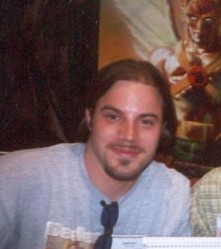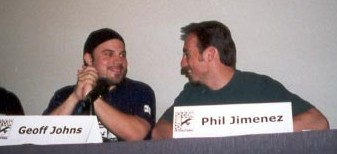
Geoff Johns seemed to come out of nowhere a few years ago, making a splash with his first book, Stars and S.T.R.I.P.E. Though a critical favorite, it didn’t quite make the same impact on readers, despite Geoff personally mailing free copies to anyone who asked. Now, of course, everyone loves it. Geoff has moved on, picking up the reins of JSA and The Flash. His next move, as everyone in comics knows, is to launch a new Hawkman series. This past week we caught up with Geoff, and he spoke at length about his dual careers in the film industry and comics. Today we run the first part of that interview, where Geoff talks about his start, where he got his love of comics, and why his JSA is just so cool.
Derek McCaw: You started off professionally as an assistant to director Richard Donner. How did you make the leap from his assistant to writer for DC?
Geoff Johns: I was working on a movie called Conspiracy Theory, that we shot in New York City. I had gotten in touch with some people at DC, who sent us some Big Book of Conspiracies stuff out with the movie, because it was a Warner Brothers movie. And I invited the editors to the set. We got to talking, I was a comic book junkie, and they said “you should pitch us something. You should pitch us something.” So I did. And one of the editors liked the idea, and that was Stars and S.T.R.I.P.E. and it just sort of snowballed from there. It was supposed to just be a side thing, but I had a great time doing it, and when other opportunities came up, like JSA and The Flash and everything else, I just really ran with it.

DM: So it was actually your first pitch out of the gate?
GJ: Yep. I had a lot of, I mean I’d been working for a few years in the film industry in screenplay development so I already had story sense. I had a background that I could fall back on to sort of help me out. That gave them a little bit more trust to let me try something.
DM: Obviously, Stars and S.T.R.I.P.E. had a warm following.
GJ: A small one. (chuckles)
DM: That’s my question. It’s clear that there’s a lot of affection for it within DC. You’re using Courtney for JSA, Pat Dugan has moved to Metropolis…
GJ: Yep. He’s flying around there.
DM: So what do you think happened with that book?
GJ: It was the first thing I ever did. It just, I don’t know, didn’t catch on. Who knows what happened?
DM: Any hopes that you might be able to revive it someplace down the road?
GJ: We actually have an idea we’re going to pursue, but it’s probably going to be quite a while. It’ll probably be about a year, year and a half away, but it is something, an idea that we’re talking about already, and bringing it back in a different way.
DM: How did you go from there to getting the nod for The Flash and JSA?
GJ: JSA, you know, I had known James. He was leaving JSA and I had met with Goyer and him on the Star Spangled Kid before they started the book so they could figure out what she was all about. When James decided to leave the book, David wanted another co-writer because he liked working with somebody. And James suggested me. David also had known me already in L.A., so we tried working together, and it obviously worked out really well. So that was that. On The Flash, I’d heard it was open, and I asked to throw my name in the hat. (Editor Joey) Cavalieri gave me a shot. That was it.
DM: That was the book you wanted to write from the very beginning. What is it about The Flash?
GJ: The Flash is just…the simple fact of a guy running fast is cool. I was always enamored with his Rogues Gallery when I was a kid. I used to read my…I’m only 28, but I grew up on Silver Age comics, because my uncle had a huge collection at my grandmother’s house. When I’d go over there, I’d read all these checkerboard DC comics, like Flash and everything else. I used to love the Rogues, and I loved all these tricks The Flash could do. He was just always the coolest character. And I liked him, too, because like on The Challenge of the Super-Friends cartoon he was like the guy you hardly ever saw, but when you did, he was really cool. Just like Green Lantern. Green Lantern had that great…like Black Manta, we always loved Black Manta because he had that great voice. I think that sort of f****d me up, too, by brainwashing me a bit into grabbing hold of some of these DC characters. Just like Captain Cold. I love Captain Cold, and I think it goes back to one of the first Flash comics I read was with Captain Cold, and also that damned Challenge of the Super-Friends cartoon.
DM: And the Slurpee cup. I think he was the most common Slurpee cup.
GJ: I’ve got two of those! And a Mirror Master one, too.

DM: With your love of the Silver Age, and being hooked on The Flash, does that explain your affinity for JSA, or was that just that James liked your work?
GJ: James liked me and Goyer like me. We got on there. I didn’t even…to be honest, I had read a few Infinity, Inc.s growing up, and I’d never gotten into All-Star Squadron or anything else, but I’d always loved the original JSA. I just never thought about them that deeply because I never thought they would ever come back. I love those characters. I love Hourman – the original Hourman – I love Dr. Mid-Nite. They’re all great characters. Again, it’s a book that I absolutely enjoy working on.
DM: Do you wish you were able to work on the actual originals? You mentioned both the original Hourman, the original Dr. Mid-Nite…
GJ: Those are the ones I used to love. I like the new ones now. I like diversity in my comics, and for me to write about a bunch of white men is just boring.
DM: Fair enough.
GJ: I mean, they’re great characters, but I don’t want to write about a bunch of fifty-year old white guys. I like that we have (Mr.) Terrific, I like to keep (J.J.) Thunder, I like Hawkgirl and Star-Spangled Kid. All that diversity is what makes the team cool. Diversity not just among ethnic and religious backgrounds, but powers and origins and stuff like that. It’s just a nice mixture. So I’d much rather write about the current JSA.
DM: Do you feel like you’ve gotten out of the shadow, or did you feel there was a shadow, of Mark Waid on The Flash?
GJ: I did. Yeah, I did. But I could either worry about it or not worry about it, and I didn’t worry about it. It was daunting at first, because I did this “Mirrorworld” storyline, which I think was similar to some of Mark Waid’s themes. It wasn’t different enough. And then when we got Scott (Kohlins) onboard, and we got everything else going, and I was actually the regular writer, we got to seek out what was cool to us about Flash and focus on Wally West and his villains more. I don’t know. It hasn’t been as hard as we’d thought.
DM: How does it feel to be co-writing with David Goyer, co-plotting on JSA, and now co-plotting with James Robinson for at least the first few issues of Hawkman?
GJ: He’s on the book for, as far as I know, he’s on the book indefinitely. It’s fun. I love working with people. I love working with people I like, both as creators and people.
DM: In San Diego James Robinson mentioned that he’s clearly, if metaphorically, passed the rod of Starman to Courtney, being his way of passing the mantle of all these characters to you. Do you feel that the co-writing relationships have changed as a result of that?
GJ: No. I thought that was the nicest thing he could have ever done. We’ll just keep trying to tell good stories. That’s all that matters.
DM: Mark Waid was obviously working out some of his own stuff on The Flash. James Robinson clearly is Starman. Which of your characters is you?
GJ: Oh. That’s tough. You know what? There’s a little bit of me in every character, from Captain Cold to Flash to Mr. Terrific, to even the Star-Spangled Kid. You relate to everybody. But there’s no one character where I’d say, okay, that’s me. Not really. Not in comics.
DM: But elsewhere?
GJ: Maybe in scripts and stuff, but not in comics.

DM: How did you manage to keep your ongoing plotlines for The Flash and JSA out of Our Worlds At War? You just ended up having these two specials instead.
GJ: They just asked. We were so far ahead on our scripts that we just couldn’t tie into Our Worlds At War in the monthly books, and we didn’t want to, because we had the specials to do it. We will be tying into the Jokers event coming up. Even with a cross-over that is a surprise and something that you don’t want to bother with, sometimes you can tell a really great story. I think our JSA/Jokers cross-over turned out to be a really good story, even though it’s hardly involved with the cross-over. You don’t need to know about the cross-over to read it. It forced us to do a story focusing on certain characters and exploring them a bit more. So it can be good and bad.
DM: Let’s talk about the specials for a moment. I really enjoyed the JSA, but The Flash felt kind of weird. Your choice to use The Black Racer?
GJ: Yeah. Actually, I got the outline for Our Worlds At War, and they weren’t going to use The Black Racer at all. And I said, “I’m going to use The Black Racer,” and after I wrote the special, they went back and put (him) in their books. It turned out cool. I’m glad that we brought Cyborg back.
DM: I thought you handled The Black Racer better than anybody I’ve ever read. I just can’t stand the character.
GJ: Oh, I know. A lot of people don’t like Black Racer. You know what? I didn’t like Black Racer much, but when they said Apokolips was involved, I said, “you know what? Let’s do a race between The Black Racer and Flash because that would be fun.” I didn’t really like the character, and I decided to write it from his P.O.V. When I got into his head, and into his origin, I sort of liked him more, despite his obviously goofy look.
DM: There you go.
GJ: Yeah, we’ll say that.
DM: Then for the JSA special, I found it funny that you have the JLA involved in this war, and in their special you open with J’onn J’onnz with his eye ripped out, you lose Aquaman, supposedly, allegedly, whatever, all kinds of casualties. And the JSA comes out pretty good, in fact handles it much better than the JLA. On purpose?
GJ: Sure. They’re pros. Everybody was saying “kill, kill, kill.” I heard about all these characters dying, and I was like, I’m not even going to kill the lamest of the bunch, you know, Patriot, the lamest of the bunch. I’m not even going to kill him. I even had him survive. It’s just because it’s supposed to be a big victory. We wanted to do something different. I didn’t want to kill anybody and I wanted to have a lot of fun characters in it, and just make the point that the JSA are pros. A round of death, relatively, they look great, coming out of it unscathed.
At this point, Geoff had to stop and take a phone call from his editor. He called back a few minutes later, and we spoke further. On Monday, we’ll share that conversation, looking to the future of his books, and some of the plans Geoff has that will spin out of The Flash: Iron Heights.

